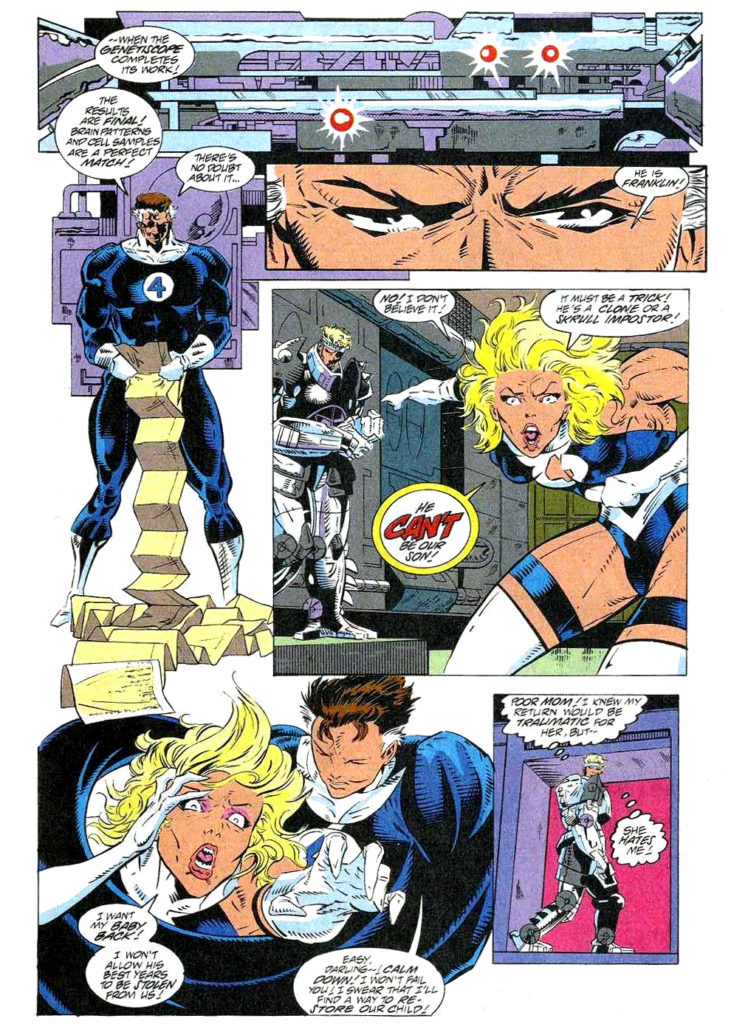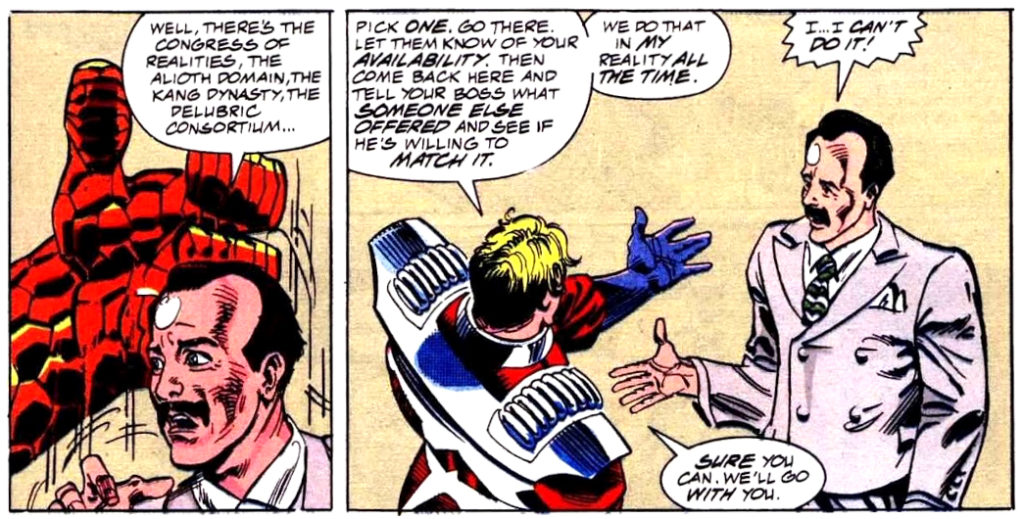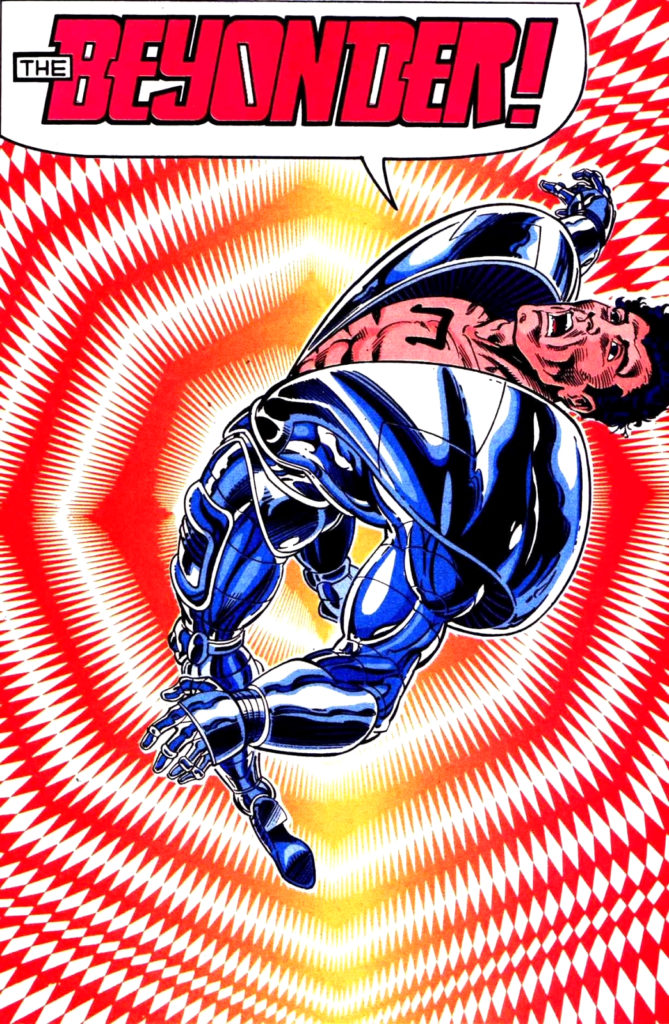Previously on Baxter Building: As Jeff and I prepare to finish up the series — the next episode of Baxter Building may be the final one! — we double back in time to take care of the last few Fantastic Four Annuals of the run. Spoilers: These are not comics that people would choose to read otherwise.
0:00:00-0:02:26: We start the episode with Jeff understandably giving me into trouble for getting the issues for this episode wrong when we set up reading plans last episode; I said we’d be doing Annual #s 24 through 27, even though we’d actually covered that one before, back in May. (How time flies…?) As it happens, our shared dislike for the issue actually acts as a great segue into talking about…

0:02:27-0:11:46: …Fantastic Five #1-5. That’s right, you thought we were going to talk about FF Annual #25 straight away? Of course not. Jeff caught up with the 1999 mini-series by Tom DeFalco and Paul Ryan after I brought it up on the Wait, What? Tumblr, and much to his surprise, liked it a lot. He (properly) compares the art to Jerry Ordway’s, and we talk about the difference in soap operatic writing when it’s rooted in joy or misery. Who would’ve thought that a follow-up series to a bunch of storylines we didn’t like by a creative team we didn’t like would’ve resulted in something that we did, in fact, like?

0:11:47-0:37:15: Meanwhile, in Fantastic Four Annual #25, we get immediately derailed by a discussion around whether or not Herb Trimpe’s 1990s art style was a parody or simply a very unsuccessful attempt to swipe the Hot Image Style of the season. Also, the Avengers come up with a new slogan that neither Jeff nor I are convinced by, a brief synopsis of the Avengers Annual that ties in with this issue helps us realize that Kang is into some freaky stuff — even if I don’t remember one of the details that Jeff brings up — and whether or not Mark Gruenwald’s reputation is hurt by this comic. (Yes.)

0:37:16-0:57:03: FF Annual #26 brings back one of the more memorable villains created by DeFalco and Ryan — which is to say, Jeff forgot him — and pits him against one of the more interesting, yet entirely forgotten, characters that Tom DeFalco created in connection with the Fantastic Four. Well, I say “pit against,” but one of the many complaints we have about this issue is that it manages to make all three of the protagonists bystanders in a struggle between Dreadface and a random gangster introduced and (spoilers) killed in this issue. But that’s not the only thing wrong here, because Herb Trimpe is doing the art once again. On the plus side, Jeff does dig the back-up feature, because he’s a sucker for Marvel Cosmic Concepts, so it’s not a total loss. And talking about that back-up leads us straight into…

0:57:04-1:16:58: …Fantastic Four Annual #27, which sees Mark Gruenwald return to write an extended — really, over-extended — in-joke about his fictional counterpart feeling dissatisfied with his job at Marvel, no, wait, I mean the Time Variance Authority. It’s staggeringly self-reflective, yet somehow not self-aware, but you’ll be surprised how long a boring comic in which the Fantastic Four are, once again, just bystanders despite their names being on the cover actually can be. Far more successful is the back-up strip, which wins points by being far too ambitious in its own right, and also bringing back the Beyonder when everyone least expected it. (But really, did anyone expect to see the Beyonder again?)

1:16:59-end: These three annuals are so bad that I raise the idea that, maybe, Fantastic Four Annuals are just bad in general, which prompts us to go back and consider when they were last good, and wonder what happened since that point. We also talk about the potential for Baxter Building to finish with episode 50, because we’re going to try to cover #406 through 416 — the end of the series — next episode. And then, we remind everyone to check out the Tumblr, Twitter, Instagram and Patreon accounts while you wait for the next Wait, What?; as ever, thanks for listening and reading. We’re sorry for all the Herb Trimpe.


For those who want the direct link… http://theworkingdraft.com/media/podcasts2/BaxterBuildingEp49.mp3
After reading 25-26 I had to nuke my eyes from orbit, it was the only way to be sure…
On another note, the RSS feed (https://waitwhatpodcast.com/feed/) has stopped updating.
Arghh, really? Thanks for the head’s up on that!
Maybe it’s just being slow for you, Bengt? Because I clicked on it and got what appeared to be the most current episodes at the top (though admittedly this is in the pre-Live Bookmarks subscription view)…
I deleted and readded the feed in Thunderbird and the latest I get there is Baxter Building 48 (so two episodes missing). It’s the same in Chrome after clearing cache and looking at the xml file.
Bengt, you are a mensch. For whatever reason, the feed validator I use totally didn’t let me know I’d made a beginner’s mistake for the first time in a long time.
Anyway, try refreshing: it should be up to date now! Thank you for letting us know, and thank you for your patience!
I don’t know why you’re apologizing to us. You’re the ones reading these issues. If anything we should be apologizing to you.
Regarding the Kang Crossover: If issue three is the most Marc Grunewald issue, issue one was possibly the most Roy Thomas issue ever where Roy Thomas tries to reconcile the fact that Gilgamesh is an Eternal (an immortal race) with the Epic of Gilgamesh where the entire theme of the story is Gilgamesh wrestles with his own mortality. It’s generally only a story that has redeeming value if you’re familiar with the plot of the ancient Sumerian epic.
I should also add, if you’re looking to read more of the Ravonna/Nebula/Temptress/Terminatrix saga, there’s a miniseries called The Terminatrix Objective where Terminatrix pretends to be Kang while ruling her empire and fighting against other cross-time powers such as the TVA and a mysterious new threat that only the Avengers can be present for while contributing little.
I didn’t dislike Gruenwald’s Kang story as much as our hosts did. In fact, I enjoyed it enough that I went ahead and read the Avengers annual to find out how it ended. Nothing fabulous, but it was, shall we say, a competent story that was hitting all the various beats that one expects in Kang stories in an entertaining enough way. A low bar, but it cleared it for me.
And, while I suspect that Gruenwald did not intend this, I found Kang’s “Thank God, Ravonna, finally you have a personality!” reaction a nice little comment on the way in which the original Lee/Heck Ravonna, like a lot of female characters from the ‘60s, was not thought to need things like “characterization.”
But our hosts are unquestionably right that this isn’t a Fantastic Four story. It’s an Avengers story that has decided to camp out in the Fantastic Four annual so that it can have two parts.
That’s part of why it works for me, I think. Paul O’Brien made a very insightful comment about the Avengers a while back that has stuck with me, which is that the Avengers are a terrible concept, because they’re not really about anything that’s much more than “team superhero book.” But, he went on, because of their long history, you can do good Avengers stories that draw on the history of the Avengers themselves.
So that Avengers stories can, in a sense, be thought to be about things like memory and nostalgia. I tend to think that’s part of why the Avengers have moved to the center of Marvel superheroes over time. The readership has increasingly leaned towards middle-aged people with an encyclopedic knowledge of Marvel history, and an interest in stories about figures from their childhood that evoke a sense of nostalgia. The Internet allows one to plug gaps in one’s knowledge and renders that history seamless in a way that it used not to be. Plus the movies, which pretty much always provoke thoughts about “Which bits of the comics were assembled for this?” and are often thought to be focusing on what’s “essential” about the characters.
So the Avengers are perfect for the moment in a way that the Fantastic Four (nostalgia=death, as I’ve argued before) and to a lesser extent the X-Men are not.
It’s why Kang is such a great Avengers antagonist, because his entire motivation is nostalgia for a “glorious” past which he can never achieve, because every time he does recreate it, he just discovers that it’s not enough to give him his adrenaline-junkie thrill – nostalgia only works if it doesn’t work, if you don’t recapture what once was. Plus time-travel has been used to give Kang such an extraordinarily baroque and complicated history of his own.
Anyway, that means that for me, this kind of nostalgia-driven continuity-heavy story (that has a bewildering number of continuity implants and retcons in it) works as an Avengers story in a way in it just doesn’t as a Fantastic Four story.
Plus, I always like seeing Gruenwald’s fanatical devotion to his home state. To the best of my recollection, Gruenwald comics were the first place where I ever heard of Wisconsin,
The first time I noticed Mark Gruenwald was a sort of pompous letter criticising the Goody Rickles issues of Jimmy Olsen. He would have been pretty young. Of interest to fans of Gruenwald may be what he writes about his efforts to convince his father (‘an educator’) that comics can be a worthwhile medium. What that MG would have made of the older one writing goofy, self-insert fanfic is impossible to answer, as I find myself unable to decide what my own teenage self would think of current me were we able to meet. However, there’s a small irony in that the existence of this story about trying to control time demonstrates a truth about time’s effects more effectively than the story’s content.
This was a genius-level comment, David. Deeply satisfying. Thank you!
I was interested in what you said about Fantastic Five. As someone who read Spider-Girl and the rest of MC2 I was surprised hearing how poor these DeFalco issues of Fantastic Four apparently are, as I had DeFalco down as a writer whose work I really enjoyed (and was even thinking of reading his earlier stuff at some point). Ironically you ‘confirming’ that MC2 actually was good makes me less likely to do that! But I would recommend the rest of MC2. Maybe being released from the constraints of not being allowed to progress the characters freed DeFalco up to produce a bit more of the soap opera which certainly seems to appeal to Jeff (and to me!)
I pretty much agree with you about annuals 25 and 26, but I enjoyed the main story of Annual 27 more than any annual since before the annual crossovers like Atlantis Attacks started. Yes, it’s a sequel to a storyline from the Walt Simonson run, and it might not have enough captions and exposition-dialogue to make sense to people who haven’t read the Walt Simonson run; but since I *had* re-read that run just a few months ago around the time you covered it, I enjoyed this annual a lot. And I think both the original Walt Simonson story, and this one, work pretty well as stories about the Fantastic Four encountering an interdimensional bureacracy even if you don’t know or recognize the meta subtext about Mark Gruenwalkd, Tom de Falco, Marvel and its competitors (DC?). When I first read the Walt Simonson run a few years ago, I didn’t know what Mark Gruenwald looked like and didn’t recognize the jokes about DC characters who’d been unmade in the Crisis on Infinite Earths, and I enjoyed it simply as a Fantastic Four story, though I enjoyed finding out about the additional layers when I listened to your podcast episode on it a few months ago. And I think this annual works on that level in a way it wouldn’t as an Avengers story, precisely because the FF have a past history with the Time Variance Authority and the TVA plays a much larger role in the story than Kang.
I agree that the Len Kaminsky story is better than the Len Kaminsky cosmic stories from earlier annuals, but I don’t think I enjoyed it as much as the main story about the Time Variance Authority.